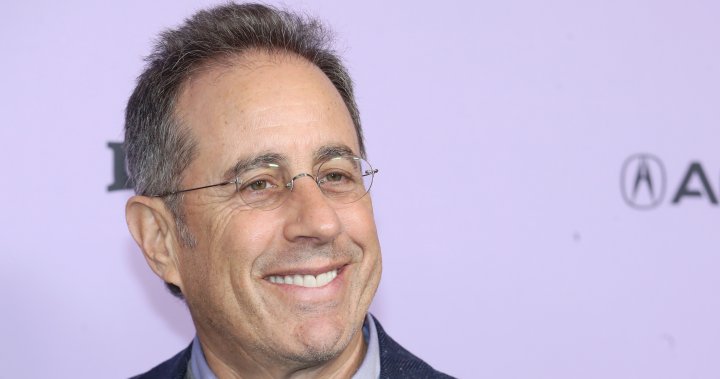Jerry Seinfeld isn’t happy about the state of TV comedy.
During a podcast appearance for The New Yorker Radio Hour, Seinfeld didn’t hesitate to share his take on the pitfalls of creating laugh-out-loud TV today.
“Nothing really affects comedy. People always need it, they need it so badly and they don’t get it,” Seinfeld, 70, told The New Yorker editor-in-chief David Remnick.
The comedian went on to say modern “PC crap” and the “extreme left” have stopped audiences from turning to comedic TV shows like his own former hit sitcom Seinfeld, which ran from 1989 to 1998.
“It used to be, you would get home at the end of the day and most people would say, ‘Oh, Cheers is on. M*A*S*H is on. Mary Tyler Moore is on. All in the Family is on,’” Seinfeld lamented. “You just expected, ‘There’ll be some funny stuff we can watch on TV tonight.’ Well, guess what? Where is it?”
Seinfeld said TV isn’t funny anymore as a “result of the extreme left, and PC crap, and people worrying so much about offending other people.”
“When you write a script and it goes into four or five different hands, committees, groups, there goes your comedy,” he said.
The comedian said the unfunny state of TV has turned audiences toward standup comics like him “because we are not policed by anyone.”
Breaking news from Canada and around the world
sent to your email, as it happens.
“The audience polices us. We know when we’re off-track, we know instantly, and we adjust to it,” Seinfeld said.
When Remnick countered Seinfeld’s argument about TV comedies, citing the popularity of Curb Your Enthusiasm, Seinfeld said the Larry David-led show is an exception because of David’s decades-spanning career. Curb Your Enthusiasm concluded its 12th and final season on HBO in early April, and Seinfeld made a guest appearance in the finale.
“Larry was grandfathered in,” Seinfeld said. “He’s old enough to say, ‘I don’t have to observe those rules, because I started before you made those rules.’”
Seinfeld said David, 76, would not be able to write jokes like those on Curb Your Enthusiasm — Seinfeld specifically points to the show’s Palestinian Chicken episode — if he were a younger, up-and-coming comic.
Out of fear of ruffling feathers, Seinfeld argued that TV studios have altogether rejected making new sitcoms.
For Seinfeld, comedy today is about flexibility. He cited a Seinfeld episode in which Kramer hires a group of unhoused men to pull rickshaws through the city.
“We wouldn’t do that joke with Kramer and the rickshaws today. We would come up with another joke,” Seinfeld said. “They move the gates, like in the slalom (skiing). The gates are moving. Your job is to be agile and clever enough that wherever they put the gate, you’re going to make the gate.”
Seinfeld is currently on a press tour to promote his directorial debut for Netflix’s Unfrosted, which details the fictionalized origin of the Pop-Tart. He will also star in the film, alongside stars Melissa McCarthy, Christian Slater, Jim Gaffigan, Hugh Grant and Amy Schumer.
This press tour is not the only time Seinfeld has discussed his woes over comedy writing in the modern era.
In 2015, Seinfeld (among other comedians) said he avoids performing standup on college campuses because students are too politically correct. He fretted college students would misconstrue his jokes as racist or sexist.
Seinfeld’s critical stance on comedy and political correctness has earned him credit among far-right influencers online — as well as billionaire Elon Musk, who shared an audio clip from Seinfeld’s New Yorker podcast and wrote, “Make comedy legal again!”
© 2024 Global News, a division of Corus Entertainment Inc.











